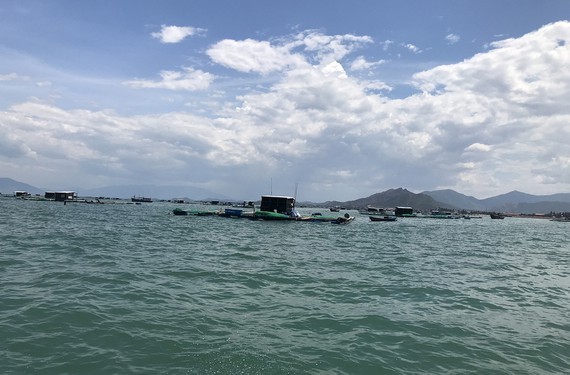
According to the Vietnam Association of Seafood Exporters and Producers (VASEP), the annual seafood imports of the EU is more than US$22 billion, while Vietnam's seafood exports to this market are only about $1.2 billion-$1.4 billion per year. Of which, wild seafood exports account for 30-37 percent with a value of $380 million-$480 million per year, an extremely modest ratio.
After receiving a yellow card from the EC more than three years ago, the VASEP started the program "Seafood enterprises committed to fighting against illegal, unreported, and unregulated (IUU) fishing" with the participation of 62 factories and enterprises. Many support and propaganda activities were also urgently deployed in provinces with the desire to remove the yellow card quickly. However, data from the Ministry of Agriculture and Rural Development (MARD) shows that, in the period from 2010 to 2019, the growth rate of seafood exports to the EU is the lowest among the top ten export markets of Vietnamese seafood, merely reaching 0.4 percent per year. Of which, pangasius exports to the EU decreased on average by 8.6 percent per year.
Because of the impacts of the Covid-19 pandemic, although there is a recovery thanks to the EU-Vietnam Free Trade Agreement (EVFTA), which takes effect from August 1, this year, the seafood export turnover of Vietnam to the EU market is forecast to decrease by up to 20 percent compared to last year.
According to the MARD, the export turnover in the last nine months reached $692 million. The seafood exports to the EU in 2020 is expected to reach $1.03 billion, down 20 percent. Of which, pangasius products exceeded $175 million, down 26 percent; shrimps reached more than $527 million, down 24 percent; tuna touched more than $131 million, down 6 percent.
Ms. Nguyen Thi Thu Sac, Vice President of the VASEP, said that in the past three years, seafood exports of Vietnam to the EU tended to decrease because of the impact of the IUU yellow card. Seafood exports dropped by 6 percent in 2018, 15 percent in 2019, and 13 percent in the first nine months of this year. However, the EU is still the key market.
Mr. Nguyen Quang Hung, Deputy Director of the Directorate of Fisheries, said that this year, the MARD had two online meetings with the EC to explain the fight against IUU fishing. The EC also said that Vietnam had put more effort and was doing it right. Over three years of implementing measures to end IUU fishing, more than 31,000 fishing vessels, accounting for 82 percent, are fitted with vessel monitoring and tracking systems. The rest of the fishing vessels has not been installed GPS trackers due to difficult economic conditions, and authorities have been encouraging them.
This is currently a big obstacle. Many fishermen wish to be supported with the cost of investment in the vessel monitoring system but have not found the financing sources. Moreover, many fishing vessels, after installing the monitoring devices following IUU regulations, have had increasing pressure on operating costs, so fishermen are hesitant in the installation of GPS trackers.
From the perspective of local management, Mr. Nguyen Viet Trieu, Deputy Director of the Fisheries Sub-Department of Ca Mau Province, analyzed that the IUU yellow card directly affects people. However, at the same time, benefiting enterprises are also affected because the export costs increase. To overcome the IUU yellow card, the VASEP should coordinate with local authorities to focus on communication, dialogue, and training with fishermen, have policies to support them to install GPS trackers, and bind them by consumption contracts. Especially, the decisive factor for fishermen not to violate IUU fishing regulations is enterprises.
Mr. Huynh Van Hai, Deputy Director of the Fisheries Sub-Department of Binh Thuan Province, proposed that all enterprises need to commit to not purchasing seafood at lower prices than the market prices to force fishermen to follow regulations on IUU fishing.
Mr. Nguyen Quang Hung, Deputy Director of the Vietnam Directorate of Fisheries, analyzed that Thailand applies a penalty of up to $1 million if the fishing vessels turn off the tracking devices when operating. Vietnam should also increase the level of sanctions as high as Thailand to prevent illegal fishing thoroughly. Through inspections, the delegation of the Vietnam Directorate of Fisheries found that many provinces have strictly obeyed the regulations. Notably, efforts to remove IUU yellow card must be made throughout and continuously. Because with only one fishing vessel violating, it will affect all others, and the EC will continue to give a yellow card to Vietnam.
According to Deputy Minister of Agriculture and Rural Development Phung Duc Tien, to ensure the sustainable development of Vietnam's fisheries, the ministry has a plan to reduce the intensity of fishing in the coming time. Instead, it will increase marine aquaculture, with the advantage of a coastline of more than 3,200 kilometers and the waters with exclusive economic rights of over 1 million square kilometers. Of these, 500,000 square meters of the water surface can be used for marine aquaculture. The ministry is developing a strategy for marine aquaculture until 2030, with the expected goal of achieving 2-3 million tons of seafood from marine aquaculture.
























